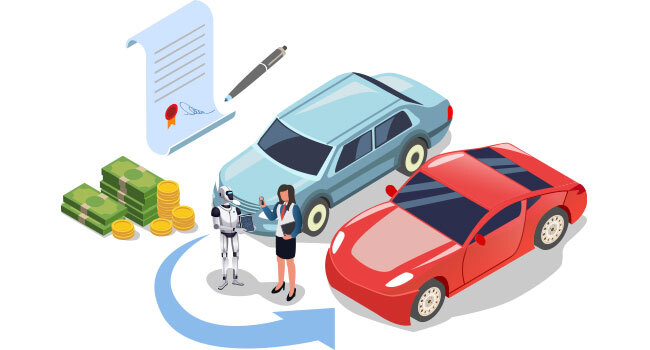Quiet often car dealership executives find it difficult to witness first-hand the many benefits of implementing Artificial Intelligence (AI) into their processes. AI solutions are often better at predicting what may take humans twice as long to compute. In most cases it takes auto-dealership executives a fair amount of time to get comfortable with idea of trusting and delegating tasks to such systems despite evidence pointing at a 20% improvement in profitability from AI-based sales planning.
AI by definition is a broad term that encompasses a number of supplementary smart technologies. When combined with Robotic Process Automation (RPA), it allows for Intelligent Process Automation (IPA). Despite its many applications in several other industries, automobile dealerships are only now beginning to recognize its potential in their own field. The key with AI is its ability to drastically improve customer experiences and automate processing of unstructured content. However, it can do so much more especially when it comes to driving auto-dealer profitability.
The biggest challenge with AI adoption is beginning to trust the capabilities of the technology. This is due to the complexity that surrounds AI and understanding its contribution to car sales. However, a number have taken a leap of faith to discover much more efficient means of handling their dealership activities.
Turning Cars
Many experts have reported a significant improvement in the overall financial health of their dealership following the integration of AI into many common dealership processes. One such avenue of application that presents itself is the regimented markdown schedule dealerships have to move cars off their lots.
About ten years ago several dealers abided by a technique commonly referred to as velocity selling in an attempt to turn inventory faster and thereby secure value for themselves. The method was based on the principle of pricing vehicles more evidently. Many companies assessed their inventory to identify vehicles that they could price below market averages to increase their turn.
The strategy began to become redundant since every dealer was doing the same thing. In this scenario a few dealers began adopting AI as a way to generate the best possible prices for their vehicle which ultimately led to a more positive response from potential clients. Over time the AI solution managed to gather enough intelligence to accurately predict other aspects such as how long it would take to sell.
Utilizing Data
The extent to which your AI/IPA solution can accurately make predictions depends on the quality of data that it is fed. The more information that the system has to work, the better the quality of the output. In most cases it can identify a vehicle right down to trims, make and model following initial training processes.
In the past dealers were dependant on straightforward averages to oversee inventory. When this information is not accurate any predictions in turn would also turn out to be inaccurate. AI/IPA solutions consider a number of elements that are critical to the dealership such as market demand, supply, competition and sales history. Data of this nature is bound to overwhelm any manual attempts made at processing it. Commonly raised queries by dealership execs can often be resolved with data available in the dealership management system. The problem lies in having this information drawn up manually. It is similar to asking someone to mow a lawn with a pair of scissors, not impossible but extremely painstaking and time consuming.
Opposition from Dealers
Scepticism on the dealer’s part is often due to the fact that they lack knowledge on how the technology actually works and the fact that AI/IPA solutions need a few test runs before they can begin to churn out accurate data. The mistrials that it may generate on the first few takes can be enough to turn auto dealerships away from this potent development.
Situations like this can be overcome by management when they set more realistic expectations for what the technology can actually do for them. In some cases, it may even take up to three months before any tangible financial results can be experienced. Auto dealerships are torn between adoption of the technology or staying true to older tried and tested methods of car salesmanship. Experts have remarked how changing with the times is key to staying relevant in a hypercompetitive sector such as automobile dealerships, and adopting innovative technology can give auto dealers a major competitive edge.
Are you interested in generating greater profits for your auto dealership? Would you like to learn more about what AI/IPA solutions can do for you? Our team at SalesCatcher would be delighted to assist you. Cater to consumers and achieve greater agility with SalesCatcher’s Intelligent Offering (iO). Our AI orchestration platform – iOFlow, working in tandem with our intelligent RPA tool – iOBot can create a highly customized experience for each of your consumers. If you’d like to find out more our AI/IPA team at would be happy to help.




